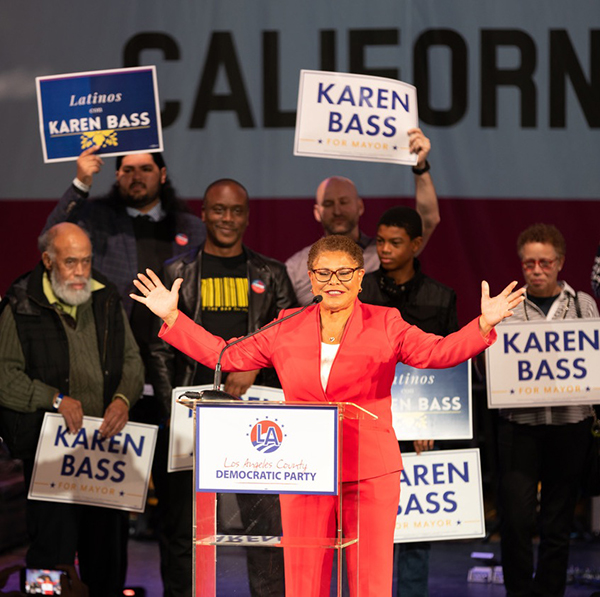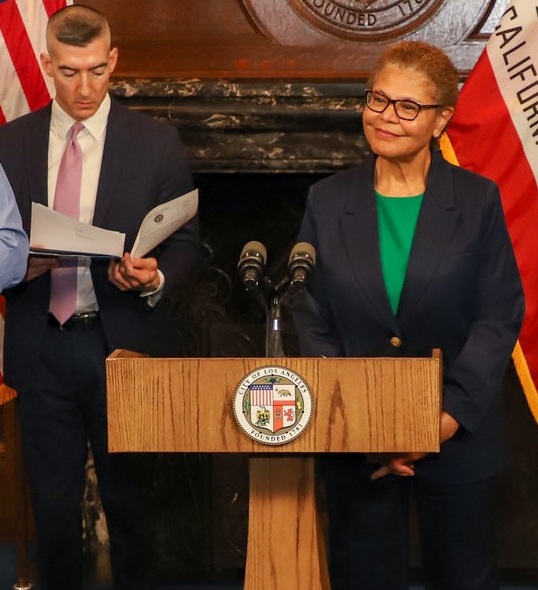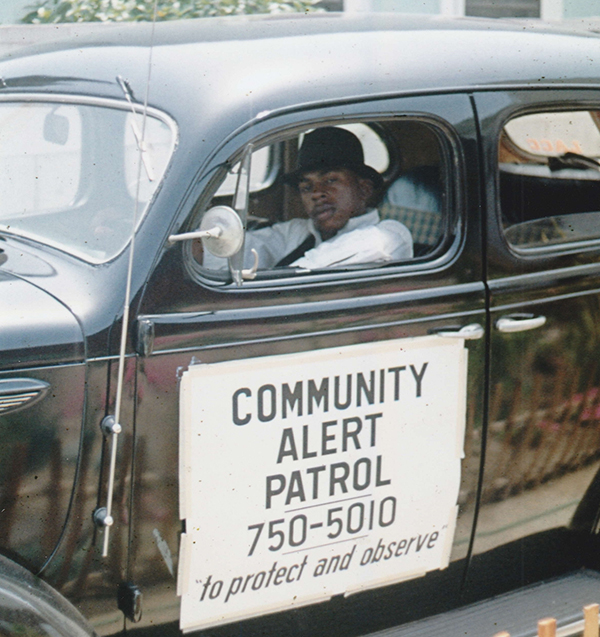By Ray Richardson
Contributing Writer
LOS ANGELES — When Karen Bass was campaigning to be the next mayor of Los Angeles, she often said the “soul of the city” was at stake.
As a homegrown product of Los Angeles’ Venice and Fairfax neighborhoods, Bass could lean on much deeper insights to address the city’s troubles than billionaire real estate developer Rick Caruso, who tried to buy his way into City Hall with more than $100 million in advertising spending.
Bass’ community-based approach helped her become the first female and second African-American mayor of Los Angeles, a journey that also led to her selection as Newsmaker of the Year by Wave editors.
“We want a City Hall that’s not just a City Hall for the powerful, not just for the wealthy, but a City Hall that is for everyone, so that we can have the quality of life that I know we deserve,” Bass said to supporters on the night of the Nov. 8 election.
Bass, 69, was sworn in on Dec. 11 by Vice President Kamala Harris and officially began her duties the next day.
The first item on Bass’ agenda that morning was to declare a state of emergency in Los Angeles to formally start the process of resolving the city’s homelessness crisis. Bass consistently labeled the crisis as one of her top priorities while campaigning for mayor.
Declaring a state of emergency on her first day in office was seen as a strong message from Bass that her campaign platform was not all talk.
“Being the second Black mayor of L.A. and the first female mayor is not my focus,” Bass said in an October interview with Spectrum TV. “What people need to see from me is that I can deliver. It’s more than the symbolism.”
Bass fought through some difficult challenges to become a symbol of victory for African Americans in Los Angeles and a national network of supporters that included President Joe Biden and former President Barack Obama.
Caruso’s enormous spending helped force a runoff election in November after results from the June 7 primary left Bass and Caruso essentially tied in a nine-candidate field to replace Mayor Eric Garcetti, who couldn’t seek reelection because of the city’s term limits. Caruso spent approximately $30 million in the primary.
Despite Caruso’s financial advantage, Bass led Caruso by as many as 12 percentage points in polling conducted through August. A new commitment by Caruso to attack Bass, fueled by another $70 million in advertising, eventually cut into Bass’ lead before the November election.
Caruso actually passed Bass by as much as 5% before the election. Several polls were indicating that Caruso’s momentum, mainly from the intense negative media ads against Bass, was beginning to make a difference, leading to fears that Caruso might win.
Caruso’s attacks centered on claims of Bass receiving a $95,000 scholarship from USC for her studies in social work while she was representing the 37th Congressional District.
Caruso also made attempts to link Bass to the controversy involving suspended Los Angeles City Councilman Mark Ridley-Thomas, who is facing trial early next year under a federal indictment for alleged funding irregularities connected to USC’s School of Social Work.
Bass showed her resolve by pressing forward with her grassroots campaign and staying focused on issues affecting Los Angeles voters.
“I applaud the people of L.A. for not being bamboozled and hoodwinked by $100 million,” said Rev. William Smart, president of the Southern Christian Leadership Conference of Southern California. “We have a champion of the people in Karen Bass. It’s good that we have someone in the mayor’s office who has a heart for all of the people of L.A.”
The community support for Bass never wavered throughout the campaign. As her grassroots support remained strong, Bass avoided the temptation of firing back at Caruso with numerous personal attacks. Bass’ determination to stay on point with her messaging reflected her approach from more than 17 years of public service as an elected official in the California State Legislature and a member of Congress.
Observers, however, believe Bass will need to maintain her community support as she prepares to take on major problems in L.A., including a dysfunctional City Council that’s still reeling from the controversy surrounding a leaked racist tape recording in October.
In a conversation with Black media organizations in L.A. during the campaign, Bass indicated she will get more involved in attempts to bring stability to the City Council. The City Council continues to struggle with the distractions of 14th District Councilman Kevin de León, who refuses to resign after his involvement in the racist conversation.
Helping the City Council become a functioning body again could become a major task for Bass, who has to get approval from the council to implement most initiatives. The council did vote in Bass’ favor on the state of emergency declaration for the housing issue.
“We all have to stand behind Bass and continue giving her support,” Assemblyman Reginald Jones-Sawyer said. “It’s lonely at the top sometimes. People will sit back and wait for her to make mistakes, then pounce on her. She needs to know the African-American community is there for her.”
A significant percentage of Bass’ votes came from African-American voters. That support is unlikely to change, although community leaders plan to hold Bass accountable on some of the promises she made during her campaign.
Bass said during her campaign that addressing economic issues in Black communities is among initiatives for her strongest supporting block.
“It’s a mistake for us to elect her and just leave her there,” Black Lives Matter-Los Angeles leader Melina Abdullah said of Bass. “We need to be thoughtful and deliberate, especially on some of the things she has committed to since she decided to run. More dollars need to be poured into our communities to make them more safe … not more money into the police.”
Ray Richardson is a contributing writer for The Wave. He can be reached at rayrich55@gmail.com.











